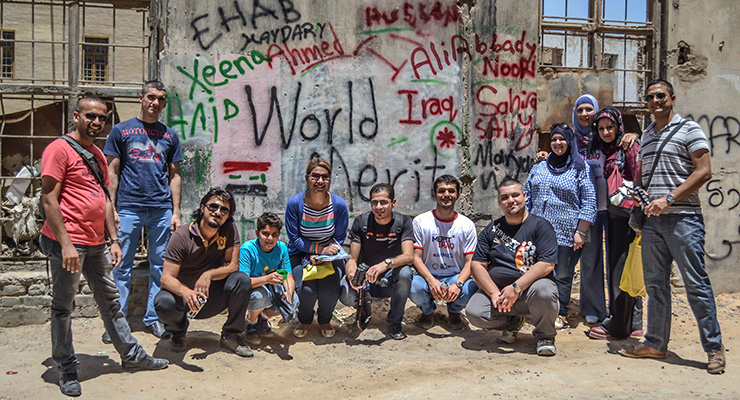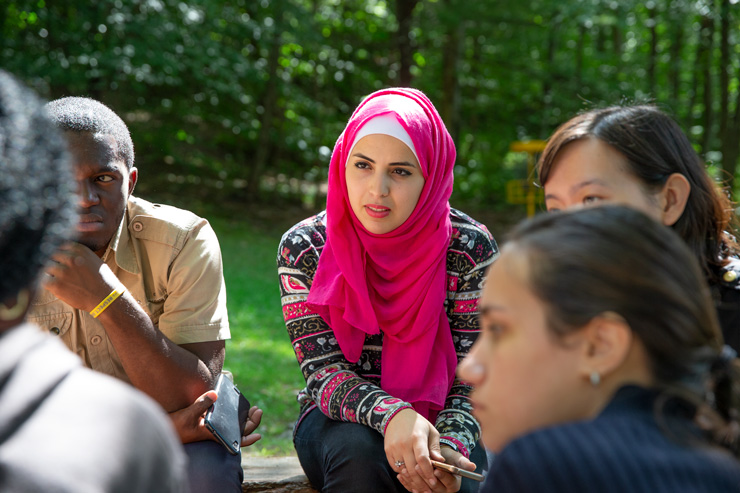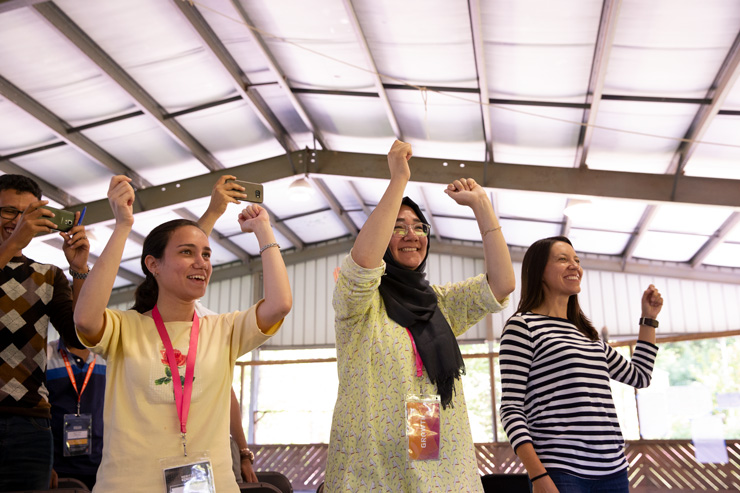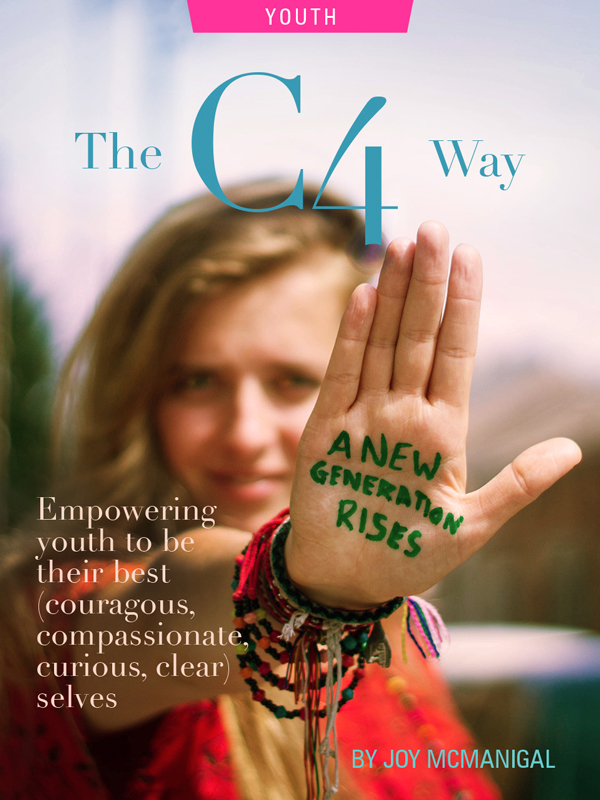Estimated reading time: 16 minutes
There actually is a formula for living a good life — and empowering youth with a recipe that combines character, choice connection and contribution.
—
Young people today are standing up and demanding to be heard as they fight the good fight. By channeling their anger and hopes in proactive and powerful ways, they are showing us how to celebrate and embrace our differences by reminding us how much we have in common — and how much is at stake. We have so much to teach each other, and so much to learn.
I love the energy and optimism of young people. I believe in their potential to create lasting and meaningful change, in their own lives as well as in the world at large. As a parent, teacher, coach, advisor and friend, I have devoted much of my life to empowering and equipping youth, our future global citizens. If not them, who?
After 20+ years as a mother to four daughters on four different life paths, I have come to realize that raising children with a sense of purpose and direction is a lifelong journey. One of my daughters recently told me she considers me ‘a painstakingly good-intentioned optimist’. Hints of cynicism aside, I embrace my glass-half-full worldview. I want my kids to thrive; I want your kids (or future kids) to thrive.
As a parent and as an editor, I see my role as a channel — a conduit for insights, information, and inspiration. Although the articles featured in this section will focus on youth, they are designed to benefit anyone of any age who wants to explore the best ways to be the best YOU (aka: your Best Self).
I hope you agree.
—
The C4 Way
Empowering Youth To Be Their Best (Courageous, Compassionate, Curious, Clear) Selves
All photographs courtesy of World Merit, a C4 Way partner
Dear Hope For The Future,
I have a very clear mission: to help you live a good life as a good person. Given the ambitious scope of this goal, I created a 4-step plan to provide a clear path on your good life journey. I call this roadmap The C4 Way.
The C4 Way Plan:
- Step 1 — CHARACTER: Good Life Values
- Step 2 — CHOICES: Good Life Mission
- Step 3 — CONNECTIONS: Good Life Goals
- Step 4 — CONTRIBUTIONS: Good Life Actions
Step One asks you to ponder: Who am I now and who do I want to become? How you answer that soul-searching question is a reflection of your CHARACTER — the collection of mental and moral qualities that shape who you are. Good character connects good actions with good VALUES — the fundamental beliefs and principles that guide your moral compass.
The C4 Way focuses on cultivating 4 core values:
- COURAGE — Be brave + gritty
- COMPASSION — Be kind + forgiving
- CURIOSITY — Be interested + engaged
- CLARITY — Be pithy + honest
The rest of this article will explore these core values.

Courage
I love The Wizard of Oz. Although Dorothy is my go-to gal, I have always had a soft spot for the Cowardly Lion and his dopey swagger and false bravado. While his traveling companions’ wishes were clear-cut — a brain and heart and home — his wish was much more nebulous: COURAGE — what it takes to confront your fears.
Life is filled with things that make us afraid or insecure — nasty and intrusive things that tend to smother our good intentions like sludge. It might be something lofty like a fear of failure (or success), or something mundane like a fear of public speaking or snakes (my personal bugaboo). Chances are that fear is wrapped around every obstacle that stands between you and your goals. What evokes your fear is not the important issue; what you do with it is.
What I learned from the Lion’s journey to Oz is that being courageous means being brave enough to be vulnerable. It means taking risks and standing up for what you believe, even if you might be perceived as wrong or different — or attacked by flying monkeys.
This vulnerability can take the form of supporting an underdog candidate, rocking a crazy hairstyle, or backing an unpopular idea. People might not agree with you, but they are likely to respect the courage it took for you to speak up or act in support of your convictions. It takes courage to not allow excuses to latch on and keep you invested in behaviors or thoughts that no longer serve you well.
Let’s say you always wanted to play the piano, but never pursued it because you believed you would never be good enough to justify the time and expense to take lessons. Instead of yielding to your fear of failure, tap into your inner well of courage and find a piano teacher that inspires you to practice and become the pianist you always wanted to be. You might never end up playing at Carnegie Hall, but at least you won’t have to live with a sense of regret born from paralyzing fear.
Courage also means having the confidence to pursue a dream — even when logically it makes no sense.
This was my situation when I decided at 23 to buy a pub in Ireland. I had several strikes against me aside from being in a foreign country: (1) I come from a family of teetotalers (until my generation at least); (2) I had never bought property or run a business; and (3) I didn’t have any money.
Most people would have seen this as three-strikes-you’re-out situation, but I was determined to find a way around these obstacles. As crazy as the idea seemed (to everyone), it also felt right (to me). So I made a choice not to listen to the practical and protective advice of the naysayers. Instead, I trusted my intuition and guess what happened? I bought a pub in Ireland.
This story illustrates another one of my favorite non-C virtues: GRIT — that great combo package of courage and perseverance. Are you willing to stick to something — a task, project, goal, a dream no matter how lofty — despite resistance or obstacles in your way? That’s grit.
Ask any successful athlete/musician/inventor how they got where they are and they will likely tell you about the countless hours they spent practicing. When their friends were hanging out or binge watching on Netflix, they were at the court/field/studio/lab doing whatever they could to succeed, over and over again.
Grit reminds us that as much as innate talent and aptitude matters, effort and dedication matters more.
Ask any successful coach whom she would rather have on her team: an athlete that is wildly skilled but lazy — or one that is less skilled but whole-heartedly committed to getting better for the sake of her team. No brainer. As anyone who has seen the film RUDY will tell you, hard work and a positive attitude will ultimately be rewarded. Yes, talent matters, but demonstrated courage matters more in the long run.
The same goes for college admissions and employers as well. Schools are looking for more than just perfect grades and test scores; they want to see examples of gritty effort. Why? Because when school (or a job or just life) gets stressful (which it will), they want to know that a prospective student won’t crumble under pressure. They want to know that students can handle adversity and disappointments without giving up and blaming others for their failures. They want students that will keep on keeping on. They want to see courage in action. Calling all innovators, dreamers, out-of-the-box thinkers and visionaries.

Compassion
We all can agree that courage rocks, but so does COMPASSION — the fuel that propels your desire to help people.
Compassion has been described as having a kind mind. I like to think of it as looking at the world with soft eyes and a gentle soul. It manifests as concern for the well being of others, their trials and tribulations, their ups and downs. It means treating people (and that means you, too) with kindness and consideration. Genuine compassion stems from respect — respect for the opinions and circumstances of someone else, whether or not you agree with them. It is this kind of sympathetic understanding that can transform combative situations into collaborative opportunities. Compassion creates conversation.
A simple way to learn how to be more compassionate is to practice walking in someone else’s shoes to see things from their perspective.
You don’t have to actually feel what someone is feeling (that is empathy), but if you want to understand why they do what they do, try to be sensitive to where they are coming from and what they are going through.
I learned to do this in the 6th grade. My school held an election that recreated the nominating and primary process of the recent presidential campaign. Long story short, I was the Republican candidate (Nixon) and I won (no comment). Unfortunately, my victory celebration was cut short by an assassination attempt. Really.
By way of backstory, my elementary school was for kids with high IQs.
One of the most valuable things I learned at this school is that being good on tests doesn’t mean you are good at life.
This was particularly true for Chris, the kid in our class who spent most of his time recreating Hitler’s blitzkrieg invasion of Europe. Glaring red flags aside, it seems that Chris was not a fan of Nixon; by extension, that meant I had to go.
So at high noon the day after the election, while we were both standing in line for the pencil sharpener, Chris tried to stab me in the neck. Fortunately, he was short and I was tall. The height differential, coupled with some quick reflexes, resulted in my hand absorbing the lead intended for my head. I was fine; he was hauled away. Crisis averted.
I never saw Chris again after his failed mission. I am reminded of our encounter, however, every time I notice the small remnant of lead that remains in my right palm. To me, this little piece of pencil symbolizes the healing power of letting go. In this case, that meant letting go of any feelings of anger or resentment about being on the receiving end of some twisted behavior.
To this day, I couldn’t tell you why Chris actually did what he did. I never learned what happened to him in his early childhood that created his inner demons, and I never retraced his footsteps while walking in his shoes. I did realize something important, however: None of those things were really about me; I just happened to be the wrong candidate at the wrong time in the wrong place.
My biggest takeaway from this unfortunate foray in presidential politics (besides never to emulate Nixon) involves FORGIVENESS — compassion in action with a twist of mercy. I forgave Chris for what he did. I couldn’t tell you if this helped him, but I can assure you it definitely helped me.
Life Lesson: Forgive yourself and others — for whatever. Just let it go.
Why? Because it feels good to release what no longer serves you. It feels lighter and cleaner. It makes space for new thoughts and feelings. Fresh starts for all. To forgive does not mean to forget. Stuff happens for a reason, so try to learn from the past. That way the bad stuff has served a higher purpose and the good stuff has given you some wonderful reasons to be in gratitude.

Curiosity
What is it that drives you to explore a new idea or concept? What is it that compels you to look something up on Google or in a book, or ponder travelling to a place you’ve never been?
That thing is CURIOSITY — the desire to learn and explore all you can, all the time.
Curiosity is the calmer, gentler version of passion. Both involve a spark of desire to discover more about yourself and your world. Unlike passion, which can be all consuming, curiosity is a form of engagement that can easily be broken into bite-size pieces to savor over time. To be clear, however, curiosity is not the same as prying.
To find your passion, start by following what piques your curiosity. What do you find intriguing or interesting enough to learn more about?
What makes you perk up your ears and pay close attention in a conversation? This is what curiosity looks like. Pay attention because these are the signs that will guide you on your path of awareness and life learning.
Curiosity can manifest in many beneficial ways. It can ward off boredom, like garlic to a vampire. It can nudge you to leave your comfort zone to connect to new people and ideas. It is also the cornerstone of a good conversation; without it, no new information gets in and no fresh air passes through the give and take of dialogue. It can start with something as simple as showing an interest and a sincere desire to explore what someone cares about. You hear someone mention their cat; ask them about their cat. You see someone wearing a concert t-shirt; ask them about the concert. It’s not rocket science, just curiosity in action.
As a kid, I loved to read mysteries. Encyclopedia Brown, Sherlock Holmes, Hercules Poirot, Miss Marple — they were all my trusted companions. But my literary BFF was Nancy Drew. I spent so much time in Nancy’s world that it felt like Bess and George were my best friends, Mrs. Gruen was my housekeeper, Ned Nickerson was my boyfriend, and a zippy Roadster was my car of choice.
As much as I admired Nancy’s home life and circle of friends, what I was really drawn to was her curiosity. Despite her young age, she already knew so much about so many things — and she was always eager to learn more. She was observant. She was tenacious. She was undaunted. Curiosity may have killed a cat, but it was the fuel that propelled Nancy into situations that more practical (or fearful) teenagers would have avoided. It’s no wonder that Nancy Drew is still a favorite of feminists of all ages.
Want to cultivate curiosity in your own life? Be a detective like my beloved Nancy. Start with a kernel of an interest and see where your discovery takes you. It doesn’t matter if your interest is fleeting or prolonged, obscure or trending with the masses. It can be a shared interest that helps you forge a bond with someone, or it can be a personal interest that you want to keep private. The important point is to find something that inspires you to think and explore.
The Internet is your friend when it comes to cultivating your curiosity. Unlike when I was a kid and had to pore through encyclopedias or card catalogs at the local library, today you can type a few words into your Internet browser and a whole new world awaits. Armchair exploration for all!
Want to spark your curiosity? Embrace your creativity and utilize your imagination.
Stare at a blank piece of paper until you get the urge to write down or draw what comes to you. Or pick up that book that you’ve been meaning to read and actually read it. Look up words you don’t understand. Wrestle with concepts that are challenging or difficult to embrace. No pressure to find the ‘right’ answer or solution. Just allow your mind to wander while you are tapping into your wonder lust.
Curiosity is your golden ticket to a good life. Without it, your brain can’t think expansively and your soul can’t breathe deeply. Without it you miss out on meeting interesting people and exploring unusual opportunities. Treasure it. Use it.

Clarity
The 4th and final core value might seem like an unlikely choice, but it’s essential. It encourages you to ask for what you want and reminds you that people are not mind readers; they are not going to know what you want (or don’t want) if you don’t tell them. What is this value that I find so important?
It’s CLARITY — a clear and direct way to communicate with your self and others.
The words you send out into the world are your Best Self ambassadors.
They represent you and set the tone for your interactions in the world. One way to think of this virtue is to imagine that you are painting a picture with your words. My suggestion: opt for creating a still life or a portrait, not an abstract!
Clarity and brevity are the unsung heroes of good communication. When in doubt, opt for less not more. Get to the point. Cut out the fluff and filler and focus on what you are really trying to say. Don’t make people guess at what you are trying to communicate. Instead, say what you mean in the simplest, most direct way possible. This applies to verbal and written conversations. If someone wants more details they can ask for them. Otherwise, assume people have short attention spans and busy schedules, so use their time (and your words) wisely.
To be clear, I am not advocating brutal honesty. When someone feels threatened or disrespected, they aren’t going to hear what you meant to say. Instead, they are likely going to shut down and tune you out once they hear words that seem harsh or unkind. So speak truth to power — but speak with kindness and diplomacy so that your words will actually be heard and create impact.
A side benefit of clarity is that it inspires honesty — with yourself and others.
Being honest means honoring your truth, whatever that may be. And as Mark Twain knew so well, telling the truth is easier in the long run because you don’t have to remember what you said.
Clarity also encourages integrity, in particular integrity with your words. Be clear and accountable so that you say only what you actually intend to do. For example, don’t say ‘yes, we should do lunch’ if you really have no intention of having lunch with that person. Better to be clear now rather than have to cover your tracks later.
Developing a reputation as an honest and trustworthy person is priceless. Which brings me to a cardinal rule: Avoid the temptation to tell white lies. These seemingly harmless little fibs are the gateway drug to a full-blown addiction to dishonesty. You might think a little falsehood won’t matter, but eventually the truth will come out. It always does.
“Of course I love raw quail egg sushi!” This was a white lie that I once told in order to impress my sophisticated foodie friend. The fact that I had never tried sushi, let alone a raw quail egg, didn’t stop me from lying in order to appear worldly and adventurous. Actually slurping that raw egg is a memory that still makes me squeamish, as much for the slimy sensation as for the memory of succumbing to a silly and unnecessary lie.
Check yourself and your words. Trust yourself to speak your truth in a clear and concise manner, even if your truth is unpopular or challenging. And remember that it’s ok to say, “I don’t know” or “I’m not sure.” If you can add…”but I’m willing to try,” all the better.
Your character does not need to be defined by your past. You can change it. You can mold it. You can determine how it manifests in the world.
It’s a big deal and it’s something that you can totally control. So if you want to be regarded — by yourself and others — as someone with good character, embrace values that help you attract and generate good. It really is that simple.
My hope for you is that the next time you ask, “Who am I?” your answer will be: “I am someone who chooses courage over fear, compassion over judgment, curiosity over apathy, and clarity over confusion.” In other words, you are someone on the path to becoming your best self…
You may also enjoy reading Kids For Peace: How a Youth Grassroots Movement Is Shifting Global Consciousness by Joy McManigal
